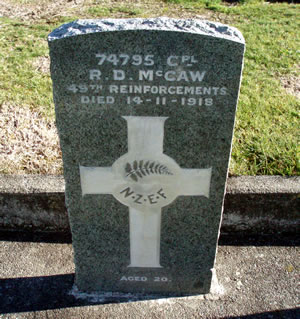One man tells of the terrible effect of the influenza pandemic on his family.
Transcript
My father, the Reverend James McCaw of Lower Hutt – although by this time engrossed in helping people ill or dying with the dreaded plague – breathed a sigh of relief that his son was not on board the Tahiti but safe in camp at Featherston. Safe? Within a week the camp was visited by death a dozen times a day. Bert was one of the victims.
A day later his sister, Nan, a year younger, joined him from the Lower Hutt manse. Here too lay the youngest of the family and their mother, all at death's door. But the parson, he was fit and well and capable. He boiled a daily brew of beef tea in the copper. He fed a score of helpless sick folk in an emergency hospital set up in the church hall, and each day he presided over 10 or a dozen funerals. He and Father Walsh were the only two ministers of religion in the valley able to get about. They buried the dead as they were brought to the grave irrespective of creed or denomination.
In the midst of all this horror came the armistice, November 11, 1918. I recall the nearby church bell ringing and my father telling me the war was over. I was only vaguely interested. He told me that Bert my brother had died. I took as much interest. He took me in his arms and carried me to see my dead sister before she was carried to the grave. He took me for a last visit to my mother for he thought that both of us would die. But we didn't. We gasped for breath, our chests and throats rattled with the passage of the hard-won air. We sweated and we shivered, we fainted and revived. Death waited for us but we survived.
Close to us lived two middle-aged women retired nurses. They bolted their doors and hid from the plague. My father burst their door open with a charge of his great shoulder and thrust them into the fray where they and he toiled mightily. So he and his wife and the rest of his family came through it. But a hundred Hutt people did not. My father lost a score of his flock and two of his children, but not his faith.

The narrator's brother, who is mentioned in the first paragraph, was Corporal Robert Duncan McCaw.

Community contributions